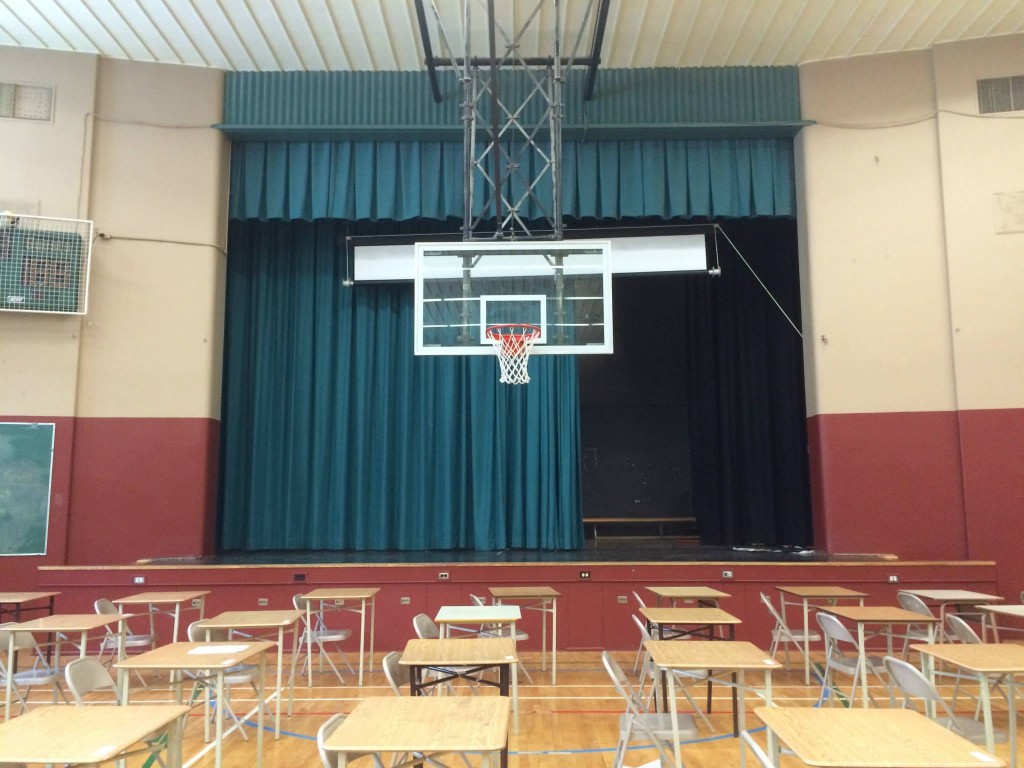
This could be any gym in any high school at this time of year: prepared for final exams with tables in a row – inspiring the fear of cheating, whispering, failing.
Over the past 30 years, we have witnessed and experienced such incredible change to how we access information and communicate with each other:
In 1985 Network file systems were invented so people could access and share data between computers.
The World Wide Web came into play a few years later and over the next little while things started to really speed up: from technologies that allowed us to access the Internet to those that allowed us to communicate to each other through it – browsers, email, html, pdfs… all of these have been around for over 20 years.
Since then – to name a scant few inventions that have not only increased the ability to bring people and information from around the world closer together but have also changed what we can do with that information – we have seen the emergence of Windows, Wikis, mp3, flash, Google, wifi, Blogs, Facebook, YouTube, iPods, Tablets, Twitter, Apple watches…
And we are still testing our children in quiet rooms, with tables in a row – inspiring the fear of cheating, whispering, failing.

But what is remarkable about this particular room is that it is not just any gym. The picture was taken in 2015 but it could have been taken in 1985, when I wrote my final high school exams at one of those desks.
Last week I attended my 30th high school reunion. There had been reunions in the past but for one reason or a few, I never participated. This was the first time I really revisited my high school as well as the people who went there with me.
High school wasn’t a highlight of memory in my life. Walking through its halls last weekend, I didn’t remember where my locker was or where most of the classrooms were. I have vague memories of soccer games, dances, drawing, our vice-principal’s office, some classes but I think my first two years were mainly spent trying to fit in and figure out how to be a teenager, and my last two were spent trying not to fit in and figuring out how to grow out of being a teenager as quickly as possible.
During the week before the reunion, much like a student during the week before exams, I felt off. There was a slight buzz of anxiety in the background of everything I did. I thought I was possibly coming down with something but, as always, my body was transmitting messages. I was looking forward to the reunion, absolutely, but I realized the people on the list were people I knew, but no one (save 1 or 2) were people who I ever really got to know. Was I feeling the old high school tension of fitting/not fitting in? Was I the only one feeling that?
I woke up the morning after the reunion tired but the background buzz was gone. The night had been a most comfortable meeting of familiar strangers. And it is because, though I had not seen the vast majority of people I spent time with that night in 30 years and though I had not spent a lot of time really getting to know them during my high school years, we were all from the same high school (and elementary schools, for most of us!) and that was enough. That night, I began to get to know some of the people I remembered/didn’t remember from high school and since then I have continued through Facebook, somewhat. And it is good.
For some of us, our children have gone through or will soon be going through the same testing process that grants them release from high school into the ‘real’ world. Some of us have younger children and, if I have anything to do with it ;), high school will be recognized as part of the real world by the time they get there and the testing process will no longer be structured along rows of desks, silence, and fearful anxiety.
However their high school will be structured in terms of academics, it is the people they will remain connected with. Without even realizing it, I remain a part of the community that is Mac High, Graduating Class of 1985. And it is good.
**dates for points in technology history from 25 Years: A technology timeline on GCN.com
